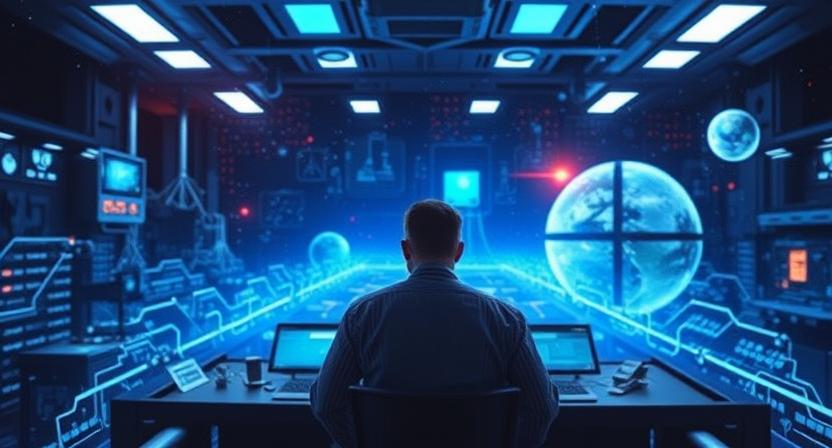For decades, science fiction has served as a source of inspiration, presenting futuristic concepts that seemed beyond reach. From artificial intelligence to space colonization, many of these once-fantastical ideas are now becoming tangible realities. The next wave of technological innovations is poised to reshape society, bringing humanity closer to the futuristic visions once confined to the pages of novels and the screens of Hollywood films.
Artificial Intelligence: The Rise of Superintelligent Systems
AI has already become an integral part of our lives, but the next stage of AI evolution will bring hyper-intelligent systems capable of independent decision-making and human-like reasoning. Artificial General Intelligence (AGI) is a concept long imagined in science fiction, but researchers are now making significant strides toward creating machines that can think, learn, and adapt autonomously across multiple domains.
AI-driven assistants will go beyond voice recognition and basic automation. They will understand emotions, anticipate needs, and engage in meaningful conversations with humans. From personal AI companions to AI-powered legal and medical advisors, these intelligent systems will redefine how humans interact with technology.
Space Colonization: Humanity’s Expansion Beyond Earth
The concept of interplanetary colonization has been a staple of science fiction, but with companies like SpaceX, Blue Origin, and NASA pushing the boundaries, humans are on the cusp of becoming an interplanetary species. Mars colonization is no longer just an idea; with planned missions in the coming decades, sustainable human habitats on the Red Planet could become a reality by the mid-21st century.
Beyond Mars, space tourism will become more accessible, allowing civilians to experience the cosmos firsthand. Orbital hotels, moon bases, and asteroid mining operations will mark the beginning of humanity’s expansion beyond Earth, fueling new economies and technological advancements in space travel and resource utilization.
Quantum Computing: The Next Leap in Computational Power
Quantum computing, a concept often explored in speculative fiction, is on the brink of revolutionizing how we solve complex problems. Unlike classical computers that rely on binary processing, quantum computers utilize qubits to perform computations at speeds previously unimaginable.
This breakthrough will transform fields such as cryptography, pharmaceuticals, and climate modeling. Quantum computers will be capable of simulating molecular structures for drug discovery, solving previously insurmountable equations, and optimizing logistics and artificial intelligence in ways that will change industries forever.
Nanotechnology and Molecular Manufacturing
Imagine a world where tiny machines can repair cells, eradicate diseases, or even build objects atom by atom. Nanotechnology, a frequent theme in futuristic literature, is steadily advancing toward practical applications.
In medicine, nanobots will enter the bloodstream to detect and neutralize viruses or cancerous cells, offering a revolutionary approach to healthcare. In material science, molecular manufacturing will enable the creation of ultra-strong and lightweight materials, leading to more durable infrastructure, self-healing surfaces, and enhanced wearable technology.
Brain-Computer Interfaces: The Fusion of Man and Machine
The idea of connecting the human brain to machines has long fascinated both scientists and storytellers. Thanks to breakthroughs in neuroscience and artificial intelligence, brain-computer interfaces (BCIs) are rapidly progressing toward real-world applications.
Companies like Neuralink are developing technologies that allow individuals to control devices with their thoughts. This advancement will pave the way for new forms of communication, enhanced cognitive abilities, and even direct access to the internet via neural implants. BCIs have the potential to restore mobility to paralyzed individuals and revolutionize how humans interact with digital environments.
The Metaverse and Extended Reality
Virtual reality (VR) and augmented reality (AR) are evolving into fully immersive digital realms known as the metaverse. This technology will transform the way people socialize, work, and entertain themselves. Instead of merely observing digital content, individuals will interact with it in real-time through immersive 3D environments.
The metaverse will revolutionize education by offering lifelike simulations for students and professionals alike. Businesses will establish virtual storefronts, and remote work will transition into collaborative virtual offices where colleagues interact as if they were in the same room. The fusion of reality and digital worlds will redefine everyday experiences.
Renewable Energy and Advanced Sustainable Tech
As the world moves toward a greener future, advancements in renewable energy will take center stage. Science fiction has long envisioned cities powered by limitless, clean energy, and in reality, we are making strides toward achieving that vision.
Fusion energy, once thought to be decades away, is nearing practical implementation. Unlike traditional nuclear power, fusion generates vast amounts of energy with minimal waste, promising an era of abundant and sustainable power. Solar energy innovations, such as space-based solar farms, will further revolutionize how we harness energy beyond Earth’s limitations.
Automated and Smart Cities
The cities of the future will be shaped by automation, AI, and smart infrastructure. Urban environments will integrate self-sustaining buildings, AI-driven traffic management, and autonomous public transportation. Predictive analytics will optimize resource distribution, reducing waste and improving efficiency in energy use, water management, and emergency response systems.
Smart homes will further integrate AI assistants, IoT-enabled appliances, and real-time security monitoring, making everyday living more convenient and efficient. With these innovations, urban life will become more sustainable, efficient, and interconnected.
Ethical and Social Implications of Future Tech
As these groundbreaking technologies become realities, ethical considerations must be addressed. The rise of AI and automation will require new discussions on employment, privacy, and human rights. Genetic enhancements and brain-machine interfaces will raise concerns about identity, personal autonomy, and societal divisions between the technologically augmented and non-augmented individuals.
Additionally, issues surrounding data security and AI-driven decision-making must be carefully managed to prevent biases, misinformation, and the potential for misuse of powerful technologies. As we step into this new era, global regulations and ethical frameworks will play a crucial role in shaping a future where technology benefits humanity as a whole.
Conclusion
The boundary between science fiction and reality is rapidly fading as emerging technologies continue to break barriers. AI, space travel, quantum computing, nanotechnology, and brain-machine interfaces are no longer confined to the imagination—they are actively shaping the world of tomorrow.
The next wave of tech innovations promises to enhance human capabilities, expand civilization beyond Earth, and create new opportunities for progress. However, as we embrace this future, it is imperative to approach these advancements with ethical foresight, ensuring that technology serves humanity responsibly and equitably. The future is no longer a distant dream; it is unfolding before us, one breakthrough at a time.






Leave a Reply